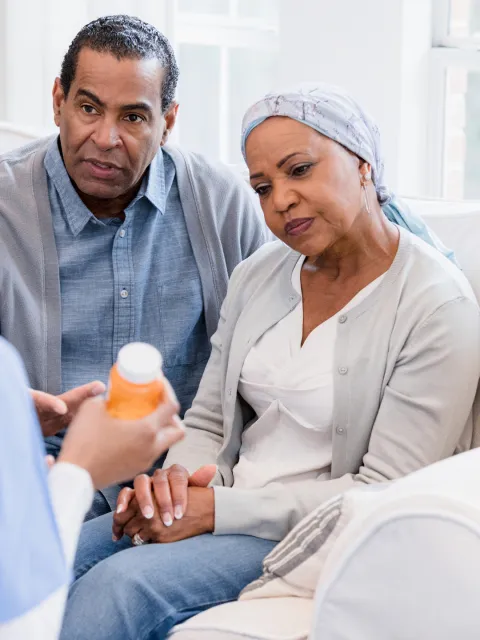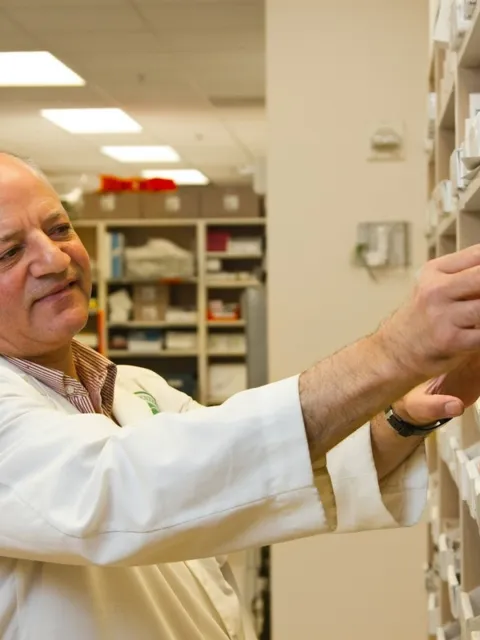UICC leads discussion on AMR's impact on cancer care at UN side event in New York
UICC organised a panel discussion on antimicrobial resistance (AMR) and cancer, during a two-day multistakeholder event at the United Nations in New York, drawing over 45 participants from Member States, civil society organisations, UN agencies, and the private sector.

Dr Sonali Johson, Head of Knowledge, Advocacy and Policy, UICC
HIGHLIGHTS
- UICC, in collaboration with other partners, hosted a side event at the Swedish Mission to the UN in New York, to raise awareness of the negative impact of AMR on people living with cancer.
- The event included presentations from a lymphoma survivor, an oncologist, and a representative of BD, who shared their experiences and evidence on how AMR affects cancer care and outcomes.
- The event highlighted the need for multisectoral collaboration, infection prevention and control, and optimisation of existing therapies to tackle AMR.
- The speakers also urged the participants to use the upcoming high-level meeting on AMR in September as an opportunity for collective and immediate action.
On the morning of 14 May, UICC led a side event at the Swedish Mission to the United Nations (UN) in New York, in collaboration with the Permanent Mission of Sweden to the UN in New York, the Swedish Cancer Society, ReAct, and the Norwegian Cancer Society. The aim was to raise awareness of the negative impact of AMR on people living with cancer.
The side event was attended by more than 45 participants, including Member States, CSOs, UN agencies and the private sector.
Malin Grape, Sweden’s – and the world’s – first Ambassador on AMR opened the session and talked about the upcoming high-level meeting on AMR in September as an opportunity for collective and immediate action, and emphasised the need for global investment and clear, measurable targets to tackle AMR.
Diane Flayhart from BD presented findings from the Cancer and AMR Consortium study, revealing that hospitalised cancer patients face 1.5-2 times more antimicrobial resistance in certain pathogens compared to non-cancer patients.
Kristen Molven, a lymphoma survivor, shared a powerful testimony about her dependence on effective antibiotics during her treatment. Dr. Yehoda Martei, an oncologist and member of the UICC-led Task Force on AMR and cancer care, provided a clinician's perspective, stressing the need for enhanced infection prevention and control (IPC) and stewardship efforts.
The discussions also focused on multisectoral collaboration, with Ramanan Narayanan, the founder and president of the One Health Trust, and Anna Sjöblom from ReAct emphasising the importance of optimising existing therapies and engaging diverse stakeholders.
Participants also highlighted the importance of engaging with communities to collectively push for better implementation of IPC.
The event concluded with a call for concrete and measurable targets to galvanize global action.
The multistakeholder dialogue on AMR
On 15 May, the multistakeholder dialogue opened with remarks from the co-facilitators of the political declaration (Malta and Barbados) and testimonies from Vanessa Carter and Anthony Darcovich, who are members of the newly formed WHO Taskforce of AMR Survivors.
The agenda for the dialogue included three panels focused on:
- Adequate, predictable, and sustainable financing of and investments in the AMR response to support country-level implementation
- Addressing antimicrobial access, research and development (R&D), and innovation
- Effective governance, leadership, and coordination of the AMR response at the national, regional and global levels
UICC delivered two statements and the Norwegian Cancer Society also delivered a statement aligned with UICC priorities on AMR. The voice of the cancer community was very visible at the hearing and many organisations approached UICC to offer thanks for raising the critical connections between cancer treatment and care and AMR.
In the evening of 15 May, UICC co-hosted a side event with the UN Foundation, WHO, The Fleming Initiative and the British Society for Antimicrobial Chemotherapy. The objective of the event was to showcase stories and solutions from AMR-impacted communities.
Dr Sonali Johnson, UICC's Head of Knowledge, Advocacy and Policy, closed the meeting by emphasising again the impact of AMR on cancer care, and highlighting the crucial role of all health organisations in taking action against AMR.
"AMR is a serious threat to the progress we have made in cancer control and to the lives of millions of people living with cancer. We need to act now and ensure that the high-level meeting on antimicrobial resistance in September delivers a strong and ambitious political declaration that will translate into concrete and measurable actions at the national and global levels. UICC stands ready to work with all stakeholders to address this challenge and ensure that effective antibiotics remain available for current and future generations of cancer patients."
– Dr Sonali Johnson, Head of Knowledge, Advocacy and Policy, UICC
Last update
Friday 17 May 2024
